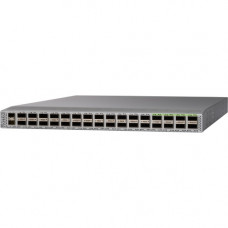Shopping Cart
0 item(s) - $0.00- Accortec, Inc.
- Addon Tech
- Advantech Co., Ltd
- Axiom
- BLACKBOX
- C2g
- Chief Manufacturing
- Cisco
- Dell
- EATON
- EMC
- Enet Components, Inc.
- Fortinet
- Getac, Inc
- HP
- HPE
- IBM
- Intel
- Legrand Group
- Lenovo
- Lexmark
- Middle Atlantic Products, Inc
- Monoprice, Inc
- National Products, Inc
- Panduit Corp
- StarTech.com
- Supermicro
- TDK
- Tripp Lite
- Veritas Technologies Llc
Cisco Nexus 9332C Switch - Manageable - 2 Layer Supported - Modular - Optical Fiber - 1U High - Rack-mountable - 1 Year Limited Warranty - TAA Compliance N9K-C9332C
Add to Compare
Industry shifts are redefining IT at all levels. On-premise IT consumption models are shifting to cloud-based services. IT as a Service (IaaS) is supplanted by applications as a service. Separate development and operations are moving toward integrated Development and Operations (DevOps). Device-centric management models are migrating to application-centric management. Business agility requires application agility, so IT teams need to provision applications in hours instead of months. Resources need to scale up (or down) in minutes, not hours. Traditional approaches take a siloed operational view, with no common operational model for the application, network, security, and cloud teams. A common operational model delivers application agility, simplified operations, assured performance, and scale. The Solution: An Application-Centric Approach to Managing Your Infrastructure Cisco® Application Centric Infrastructure (ACI) is a holistic architecture with centralized automation and policy-based application profiles. The Cisco ACI fabric is designed from the foundation to support emerging industry demands while maintaining a migration path for architecture already in place. The fabric is designed to support the industry move to management automation, programmatic policy, and dynamic "workload-anywhere" models. The Cisco ACI fabric accomplishes this with a combination of hardware, policy-based control systems, and software closely coupled to provide advantages not possible in other models. The fabric consists of three major components: the Cisco Application Policy Infrastructure Controller (APIC), spine switches, and leaf switches. These three components handle both the application of network policy and the delivery of packets. Organizations can use the ACI-ready Cisco Nexus® 9000 Series Switches as spine or leaf switches to take full advantage of an automated, policy-based, systems management approach. The Cisco Nexus 9300 Series Switches include both spine and leaf switches.
Technical Specifications:
Uplink Port: NoModular: YesStack Port: NoPort/Expansion Slot Details: 32 x 100 Gigabit Ethernet Expansion Slot, 2 x 10 Gigabit Ethernet Expansion SlotMedia Type Supported: Optical FiberEthernet Technology: 100 Gigabit Ethernet, 10 Gigabit EthernetNetwork Technology: 100GBase-X, 1000Base-XNumber of Total Expansion Slots: 34Expansion Slot Type: QSFP28, SFP+Number of SFP+ Slots: 2Layer Supported: 2Manageable: YesPower Source: Power SupplyRedundant Power Supply Supported: YesCompatible Rack Unit: 1UForm Factor: Rack-mountableHeight: 1.7"Width: 17.3"Depth: 22.9"Weight (Approximate): 25.10 lbEnvironmentally Friendly: YesEnvironmental Certification: RoHS-6
Write a review
Your Name:Your Review: Note: HTML is not translated!
Rating: Bad Good
Enter the code in the box below:


